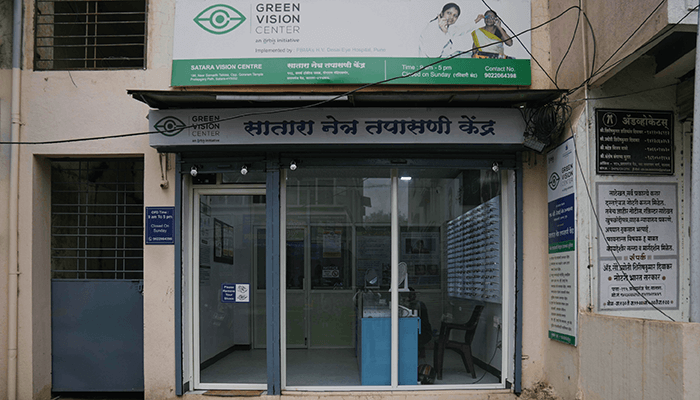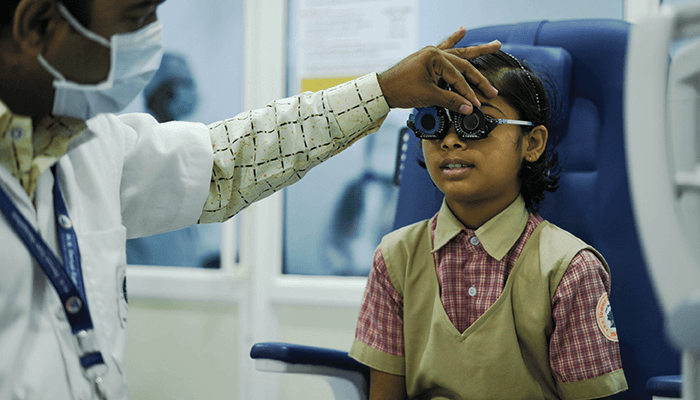
India is home to more than 20 percent of the world’s blind population, including the largest number of blind children (1). As the divide between the rich and poor continues to grow, a significant portion of the population – most of whom live in rural India or urban slums – are left without access to basic healthcare services.
With only 16 ophthalmologists per million people in India, and fewer than 50 percent performing critical surgery, the demand for ophthalmic care is at an all-time high (2). This need is especially clear in the pediatric population, where more than 1.61 million children live with uncorrected refractive errors, which not only affects sight but also crucial childhood development (3). Often easily rectified with simple interventions, such as spectacles, pediatric eye care remains one of our top priorities.
School screening
Successfully supporting local partners in India and Nepal to provide more than five million screenings and examinations for children since 2016, Orbis’ holistic and scalable REACH (Refractive Error amongst Children) program aims to tackle visual impairment in children in their communities (4).
How does REACH work? REACH follows a structured protocol and aims to screen all school-age children in the catchment area. Once permission is granted from the school authority, an outreach team from the Vision or partner hospital visit the school and screen children for eye health problems (primary screening). Those children identified with Refractive Error are then referred for a secondary screening to undergo a more detailed examination by an optometrist. Should they require spectacles they can choose from a broad selection of bright colorful ones and hospital counselors are on hand to provide support and address any concerns. The team either return to the school to deliver the spectacles and ensure their fit or the children with their parents can go to the Vision Center. All patient data is entered in REACHSoft which records the level of refractive error and tracks the children’s journey along the referral process.
REACH team members carry out surprise (the teachers know) follow-up visits three months after assessment to check that children are wearing glasses as prescribed. If they are not wearing them they ask the child questions to identify the reasons why not, e.g lost, broken, uncomfortable or if they cause headaches. They then work together to solve these problems. The REACH process also ensures an annual follow-up visit is conducted to evaluate all the children seen the previous year as well as all new students. The follow up is a unique feature of REACH as many health providers prescribe spectacles but do not check whether the children are wearing them or not.
A centered solution
As well as organizing outreach activities in schools following the REACH protocol, Vision Centers provide day to day eye care services to the whole population – serving all age groups. These services include detailed eye screening, the prescription of spectacles and medicines as well as minor procedures.
Orbis is supporting the expansion of local Vision Centers within India. Based in the heart of local communities Orbis supported Vision Centers offer affordable care for low-income individuals and free care for those who are unable to pay. With the ability to serve a population of 100,000 people, the Vision Centers are an exceptionally cost-effective and inclusive solution for maximizing access to sight-saving care.
Orbis support includes providing technical screening equipment for teleconsultation with ophthalmologists in the base hospitals (some 50km) away. Training is also provided on how to use this equipment as well as how to manage the Vision Centers. Funding is provided for staff salaries and running costs, as well as training on how to use and service the equipment. Those with more complex eye care needs including surgery will be referred to the local hospital for treatment.
To help establish a new Vision Center in India, Orbis UK and Hoya UK have recently announced their ambition to raise £50,000 for Orbis UK by participating in fundraising activities including in-practice contactless donation terminals. The partnership builds on global work already supported by Hoya Vision Care, that includes the REACH program and Vision Centers. When the £50,000 is raised by Hoya UK, the new Vision Center in India will take an estimated three to four months to establish.
Going green
You might be surprised to hear that the Vision Centers established by Orbis may become self-sustaining in a total of three years, once funding for those first three years is secured. Revenue is generated in several ways. Firstly, through spectacle sales that range in cost from £1.50 to £5.50 and are conveniently offered on-site so that people don’t have to travel (this is especially important for women and girls, who have less access to services). Secondly, revenue is generated through modest registration fees; for patients who can pay, this fee is less than £1. Any profits that are made are reinvested into Vision Centers to expand their reach enabling others to come forward for treatment.
In addition to financial sustainability, the green and energy-efficient approach – including the use of solar power, digital data management, and efficient appliances – leads to the following sustainability benefits:
- Reduction in carbon emission compared to a regular vision center
- Significant reduction in electricity expenses
- Reduction in the use of paper due to digital patient records
This model is already being rolled out in Bangladesh through women-led Green Vision Centers.
Over the years, each country has developed and/or adapted Vision Center models and expanded its primary eye care services using technology and innovation to reach communities and schools. The World Report on Vision by the World Health Organization (WHO) recommended that the Integrated People Centered Eye Care (IPEC) approach is essential to achieve “Universal Eye Health Coverage” (5). And this ambition lies at the core of Orbis’ community-based eye-care approach.

References
- Orbis, “India.” Available at: https://bit.ly/3YP3dnz.
- Y D Sapkota, “Human Resources for eye health in South Asia,” Community Eye Health, 31, S1 (2018). PMID: 30220813.
- Orbis, “Fighting blindness in India.” Available at: https://bit.ly/407eQXV.
- The International Agency for the Prevention of Blindness, “Vision Excellence Awards: Rishi Raj Borah.” Available at: https://bit.ly/3liynWH.
- World Health Organization, “World Report on Vision.” Available at https://bit.ly/3L6QKYw.
